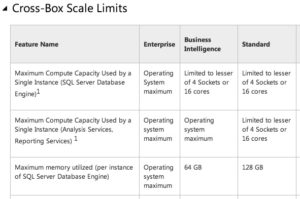I got in a lot of trouble when I wrote that SQL Server 2014 Standard Edition Sucks.
That post generated a lot of public discussion, and it also generated a lot of private ill will for me. I heard from several Microsoft folks who were downright angry. How dare I voice an opinion like that? I even heard from MVPs who told me I shouldn’t criticize Microsoft in public, only in private.
I didn’t back down, and I didn’t apologize. I believed in the post, and I never heard anyone arguing that Standard should indeed be capped at $500 of memory. And amazingly, I’m still an MVP.

Good news: Microsoft marketing heard our cries, and raised SQL 2014 Standard Edition’s limit to 128GB (or at least, the latest Books Online pages read that way.)
I don’t know if my blog post had anything to do with it, but I do know a lot of folks who have been quietly and politely raising this issue for years – long before SQL 2012 came out – and we haven’t seen any relief.
I like to think of my blog post as an act of civil disobedience – raising awareness of an important issue for DBAs. I’d like to challenge you to do the same. When you believe in something, talk about it. Fight for the things that matter to you. Consumers have a bigger voice than ever before, and what you think matters.
Yes, there’s going to be haters who tell you to be quiet and do as you’re told. You have to learn how to handle the haters. Life is too short – get out there and make a difference. Build things. Help people. Someone’s always going to complain about your methods, but you have to stand up for yourself and your beliefs.


39 Comments. Leave new
I’m so happy about this news. And so sad I have no SA on my newly built 2012 cluster.
This would indeed be SUPER knews for the 9x% of installed SQL instances that are NOT enterprise edition! I have been bringing this up at virtually every user group/SQL Saturday I present at for a long time. I even mention it as the WORST thing NOT changed in SQL 2014 in my presentation on SQL 2014 New/Enhanced Features.
I sincerely hope they back-fill this increase to at least SQL 2012, but I wouldn’t at all be surprised if they didn’t because it is such a HUGE (almost ONLY really useful) carrot to get the Standard Edition users to upgrade to 2014.
I do like this as a carrot to get Standard Edition folks to upgrade. That’s a great angle.
The best argument I have when arguing to use Enterprise Edition is that Standard Edition won’t multithread DBCC CHECKDB. The business typically comes around when I tell them their maintenance cycle will be 4 times longer without Enterprise Edition.
And then they go back around after they see how much Enterprise costs!
This is a great news. But I am sad to see that there are some MVPs who will not bring up something wrong with SQL server product. I think it is their duty to inform community about the pros and cons and not only pros. Good job Brent.
Thanks, Ameena!
Not all MVPs are silent. I’m outspoken and critical publicly when I need to be, but there are many “battles” behind the scenes that I don’t air publicly, either. Bottom line is that MS does listen even though people think they don’t. Whether or not they do what you want is a different story.
WHAT??? They managed to keep the memory limited to what you can get on a $100 SD Card? Am I still limited to making sure my tables are indexed, forced to learn about SARGability, and write out my column names instead of using *?
Seriously, thank you for making this subject so public. Microsoft could never give you credit for it, but I’m sure you helped influence their decision.
Awww, thanks Steve!
Nice!! Too bad they didn’t do the same on the CPU side
On that MSDN page there is a typo for either the amount of memory SQL Server standard edition allows or the amount of memory the database engine in BI edition allows. They’re the same database engine install so either they’re both 64GB or both 128GB.
Barry – so you’re saying BI and Standard will have the same limits in 2014 just because 2012 did?
Having just watched the first episode of Cosmos twice, I would encourage everyone to question everything.
Might the decision have been based on a survey of the installed base of SQL Server? To make Enterprise Edition reflect the upper crust specs of the already installed base? Until recently I was at an organization that limited all VMs to 16 GB. In that environment they would just let a thousand Standard Editions bloom.
Thanks for posting about this Brent. My 128GB servers will be happy to hear the news as well.
Thanks Brent for your original post. That is great news.
[…] Good News About SQL Server Standard Edition’s Limits – Brent Ozar (Blog|Twitter) […]
And it looks like they didn’t remove Database Mirroring? It was deprecated, but somehow survived. At least it is listed under HA section.
Buffer Pool Extension goes to people who can already have lots of RAM, I mean it’s only in Enterprise Edition. That’s not logical 🙂
Columnstore also only EE.
The same page has also been updated to show Buffer Pool Extension available for EE, BI, and Standard
Check that… it says Yes for BPE under scalability and performance, and No under RDBMS Manageability. Clearly still a living document and not reliable until SQL Server 2014 actually releases RTM.
It would be awful if BI edition was limited to 64GB of RAM also. I personally think it shouldn’t be limited in BI edition, as it is a step up from standard. If Microsoft wants to compete more in BI world, they need to remove barriers for smaller companies.
I think this thought should also go towards SQL Express. If Microsoft wants to compete with MySQL and other open source DBMS’s, they need to increase the limitations of 10GB DB size and 1GB of RAM. I think it is a joke that it is limited to this size.
I’m a bit late to this party. If you had anything to do with this change, I owe you a beer.
Heck, I’ll buy you one anyway.
DEAL!
Is there anyway to verify if this is just a typo or if this is truly legit? This would make the move from Enterprise to Standard a lot easier pill to swallow.
Prior to a few days ago, it read 64. Seems like an awfully curious way to introduce a typo. 😉
I did find this in the release notes:
3.1 Changes made for Standard Edition in SQL Server 2014 RTM
SQL Server 2014 Standard has the following changes:
The Buffer Pool Extension feature allows using the maximum size of up to 4x times of configured memory.
The maximum memory has been raised from 64GB to 128GB.
http://msdn.microsoft.com/en-us/library/dn169381(v=sql.15).aspx
Nice going, Brent. Regardless of whether or not your post had anything to do with it, good on you that you spoke up about something you disagree with.
The way I see it, it’s our job as consultants to help our customers get the best possible product for their needs and budget. That means you advise them without bias, and highlighting both the good as well as the bad. That’s the only way a customer can get to an educated decision.
If the only way one could/would be allowed be be a Microsoft MVP was by never criticizing, it’d instantly undermine every MVP’s title. Good to see MS didn’t remove you as an MVP for speaking out.
So great they are vtaxing us like VMware. Hey Microsoft how about dont pull a move like Vmware did you think you would have learned. Ppl dont buy enterprise for just using ram lets be frank. Availability groups is why you go enterprise in my opinion. vtaxing me on ram is just assine in my opinion even if they bumped it up. Stop being stupid Microsoft compete on feature set not on hardware use and all your customers will probably be alot happier.
This is a start in the right direction and thanks for providing the news and any impact you may have had on this.
Another issue to me is the per core license. All servers have a boat load of cores these days which makes this tricky as many times you may need the memory and faster processors but not that many cores. And then the licensing for all those cores is expensive. This and a few other things (some not SQL Servers fault probably) are causing my company to look more at Oracle.
Ron – they only have a boat load of cores if you buy ’em that way. (I’m specing out brand new quad-core servers as we speak for a client, heh.)
Aren’t you the one that sent out that advert for the new monster 6TB memory 15 core xeon servers? 🙂
How much memory do those servers max out at?
We most by HP servers in our area.
And I make commission on all the RAM you buy. 😉
I can see a lot of independent software vendors continuing to move data access to memcache rather using in memory tables, as you always have some customers with standard edition. Having to have different code depending on the edition of sql server a customer has is not pleasant and tents to lead to enterprise edition features being ignored.
The level of discontented over not being able to make use of new capabilities in SQL server are leading a lot of .NET software engineers to lose interest in learning about new versions of SQL server.
One day SQL server will stop being the default choose of .NET developers for data storage, when it happens Microsoft will lose one of their money printing machines.
Hey Brent can you also complain about not having the ability to configure a 2 x node cluster with an Availability Group in Standard Edition. This would have been another great incentive to migrate.
cheers Rob
[…] even after Microsoft ups the SQL 2014 RAM limit, you still looking at 1 stick of RAM before you hit the limit. Darn, there goes my plans of maxing […]
[…] 128GB(raised after protests) […]
Hi Brent, thanks for the information. I would like to ask you a question about limiting MSSQL Server memory. Is there any recomendation from Microsoft to limit maxsize memory in MSSQL(2012) or choose unlimited memory in the parameter? Because I need to find official information from Microsoft about what it is better. Thank you very much for your time.
Javier – this blog post is about SQL Server 2014. You’re asking a question unrelated to the post, on a stranger’s blog. This isn’t the best way to get quick, accurate answers.
Instead, check out Q&A sites like http://dba.stackexchange.com. This way you can get quick, accurate help from whole communities. (I’d rather teach you how to fish than give you a fish.) Hope that helps!